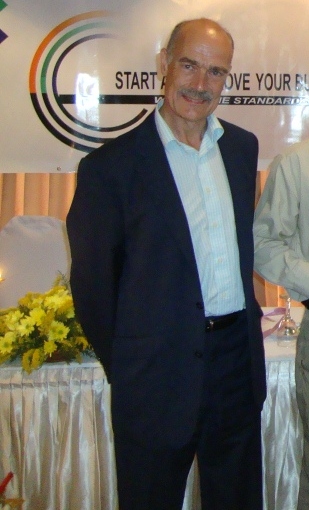Liveryman Karol Szlichcinski, Extraordinary Professor at the University of Silesia School of Management in Katowice, Poland...
... delicately picking his way through the minefield of getting his colleagues' titles right!
Last summer I took up an offer of a professorship at a Polish university, at the University of Silesia School of Management in Katowice. The role includes internal consultancy for the Rektor (Vice Chancellor) and university administration, and the potential for developing external consultancy.
I have visited Poland since I was a child, carried out short consultancy assignments there, and speak Polish with a measure of fluency. Nevertheless I was not prepared for the full extent of the cultural differences I met living and working there. The quality traditionally most valued in Polish society is ‘serdecznosc’, a hard to translate mix of warmth, openness, frankness and hospitality; it is a blend which makes the visitor feel very welcome, but does not necessarily come naturally to someone born and bred in Britain.
Polish organisations, and society in general, seem more heirarchical than we are used to in the UK. The ghosts of the Austro-Hungarian empire still stalk the corridors of power, bestowing a legacy of bureaucracy and a taste for formality and titles. One sees behaviours in the upper reaches of large institutions that would not have been out of place at a medieval court. One of the trickier tasks for a newcomer is picking the right form of address for colleagues at different levels of seniority, and modifying it appropriately as one gets to know them better. I have unintentionally offended many of my colleagues already.
My full title, when translated, is Extraordinary Professor; this is not because of any special merit but because, in the bizarre world of Polish universities, an Extraordinary Professor ranks lower than an Ordinary one. Becoming a professor at a Polish university is like becoming a Partner in a major consultancy: you think you’ve arrived, only to discover you are standing on the lowest rung of another ladder disappearing up into the clouds.
Polish universities are subject to a ferocious financial squeeze, government austerity measures coinciding with a major demographic dip reducing the numbers of students. Despite these difficulties, the University of Silesia is notably well managed. It was one of only two Polish universities not to make a loss last year and is rising up the league tables. There may be less scope for adding value through internal consultancy than I had imagined, but there are still plenty of opportunities and a receptive environment. Early challenges have included interactions with industry, digital strategy and alumni relations.
Katowice is an interesting but unlovely city in south-west Poland. It is the focus of a conurbation of a dozen or so large towns and small cities, reminiscent of Stoke and the Potteries in England. It has a strong tradition of mining and smokestack industries, and a highly skilled workforce. Many of the mines are still active, although most of the heavy industry has gone, to be replaced by modern manufacturing, logistics and other services. An enterprising Mayor is taking advantage of EU funding to regenerate Katowice, renewing its infrastructure and commissioning a series of landmark buildings befitting a major regional centre, but it is hardly a tourist attraction.
The region of Silesia borders on the Czech Republic and Slovakia, and has changed hands many times over the centuries, with extended periods of German and Bohemian rule. It has its own distinctive culture and speech, as different from standard Polish as lowland Scots is from English. The question of whether it is a separate language is a highly politicised one.
Within an hour’s drive of Katowice there are mountains offering hiking, skiing and attractive scenery, historic towns and castles. The region feels cosmopolitan, and at the centre of today’s Europe: six capital cities lie within an easy day’s drive, and the beautiful Adriatic coast of Croatia is not much further.
If any Liverymen or Freemen of the Worshipful Company would like to pursue initiatives in Poland, please get in touch.

Liveryman Karol Szlichcinski
